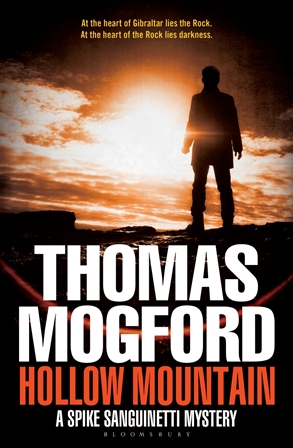Crime writer Thomas Mogford discusses the importance of planning before writing, and how doing so helped him to find the perfect ending for his debut novel.

Last year, I had the good fortune to be shortlisted for a CWA ‘Dagger’ award for best debut crime novel. Having never won a prize in my life (apart from a 10-metre swimming badge), I concluded (rightly, as it turned out) that I was unlikely to find myself up on the winners’ podium. Just in case the unthinkable happened, however, I had prepared one thing to say – namely, that the nominated book, ‘Shadow of the Rock’, was far from being my debut attempt. Crammed into a desk drawer were four full-length novels that had never seen the light of day. The principal reason for this? Failure to plan.
Like most book lovers, I am drawn to any article entitled ‘How I Write’, or ‘The Writer’s Room’. It always amazes me how many authors say they don’t plan their work. Phrases like, ‘I have my opening sentence, then just keep going’, or ‘Pretty soon the characters reveal themselves, and I follow them’, are commonplace. I used to comfort myself that this approach was viable only in literary fiction, but then I read an interview with David Baldacci, author of ‘Absolute Power’, and a master of the crime genre, in which he said, ‘The books just flow. I build them brick by brick. I don’t know how the book will end when I sit down to write’. Perhaps some people are just geniuses.
Sadly, beginning without a plan has never worked for me. When I first started trying to write, I would have a rough sense of where I was going, then just hope for the best. Two novels later – with a heap of rejection letters accumulating – I conceded that I could put a bit more work into the plotting stage. So I briefly sketched out a beginning, a middle and an end.
Starting with a clearer knowledge of where I was going definitely helped. Each chapter ended with a cliff-hanger; the next began with purpose. We were, I allowed myself to hope, finally in business. Immediately, the responses from agents were better. One emailed to say he was enjoying the book. I waited, then chased him for a follow-up. Silence. Another contacted me to say she’d started it; was I in talks with other agents? Brief jubilation. Then – nothing. Through a friend of a friend, I managed to get the book to a prestigious editor. Again they got excited – until they reached the second half. Not for us, I’m afraid. Maybe you should rethink the end.
OK, I thought, I need to think this through a bit more. So I decided to go at it chapter by chapter – a fifteen-page document detailing every event the book would contain. On the page, the results were horrifying. The second half always went awry. The finale suddenly seemed absurd. I couldn’t believe how bad the vague ideas I’d hoped would just work themselves out actually were. Writing them down had ruthlessly exposed the holes. Perhaps I just wasn’t very good at this.

Time passed. So much, in fact, that I got married. During a late-night, wine-fuelled discussion with my wife, she asked me how long I spent plotting a book. Two weeks, I said, maybe three. Why not invest a bit more time upfront, she suggested. I prevaricated (maybe shouted), then was forced to admit the truth: I’d never spent very long on plot because it was both boring, and scary – fault lines were in danger of being exposed. And because the writing part was so, well… fun. She raised her eyebrows.
A new regime began. This time, I acknowledged the problems in the second half and forced myself to write a new draft. Then another. I asked my wife to read it, and watched where her eyebrows went. Slowly, painfully, the story came together. I longed to get writing, but held off until the story concluded in a plausible and exciting way. Finally, the fun could begin. And then, a year later, someone actually made it through the second half of a book I’d written and uttered the magical words – ‘Maybe we should get together and have a chat.’
Thomas Mogford is the author of a series of crime novels following the adventures of Spike Sanguinetti, a lawyer from Gibraltar with a penchant for dangerous cases.
Top picture credit: Lowdy Brabyn
Find out more on his website and follow him on Twitter.
Comments